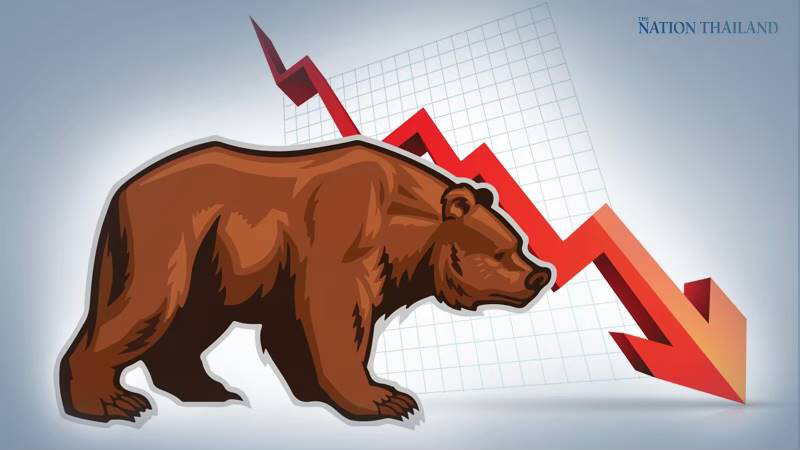Wall Street recoils after massive coronavirus rescue bill trips up a second time; Dow sinks nearly 600 points

An unprecedented blank check from the Federal Reserve and the prospect of a $1.8 trillion stimulus package from Congress failed to slow a two-week stock purge as investors grasped for signs that progress is being made against the coronavirus.
Fresh off Wall Street's worst week since the 2008 financial crisis, U.S. markets continued to skid Monday after the Senate failed for a second time to advance a $1.8 trillion coronavirus rescue package, even after the Federal Reserve announced unlimited bond purchases in an unprecedented move to lift the U.S. economy.
The Dow Jones industrial average and the Standard & Poor's 500 index were plumbing lows not seen in years. The Dow closed down nearly 600 points, or 3%. The Dow is more than 35% off its all-time high of Feb. 12, 2020.
The broad S&P 500 sank 3% and the tech-heavy Nasdaq was close to flat.
The medical picture is getting worse, as New York state sees an exponential increase in reported coronavirus infections and as deaths mount around the globe.
"The last two weeks the market has been looking for some sign the virus is slowing, or that we have effective treatments for those infected or that there may be a vaccine," said Randy Frederick, vice president of trading and derivatives at the Schwab Center for Financial Research. "This is a medical issue and we are trying to solve it with financial measures. If we are looking for a rebound, the market needs some positive health news, and they don't see it yet."
The markets saw a short-lived surge during futures trading after the Fed said it would purchase Treasurys and mortgage-backed securities "in the amounts needed to support smooth market functioning," showing the central bank is willing to go far beyond the $700 billion in new purchases announced last week.
But those gains were quickly dissolved as bad news on the health front and a fiscal stimulus mount. Investors are increasingly concerned about the enormous stimulus bill the Senate is attempting to push through on Monday. On Sunday evening, Senate Democrats said the legislation did not offer enough help for individuals. Senators from both parties, as well as White House officials, said they would continue negotiations, overnight if necessary, to respond to the flood of layoffs affecting millions of Americans and the economic pillage felt by businesses in nearly every sector.
"Today's sell-off is a combination of uncertainty in both the health side of the virus and the financial system," said Sarat Sethi of Douglas C. Lane & Associates. "Markets hate uncertainty. The uncertainty created by Congress not being able to provide a stimulus, and by investors continuing to look for a glimmer of hope on slowing the virus, are causing additional pressure on stocks like we have seen the last couple of weeks."
The bill would steer payments of $1,200 to most adults and include $500 for each child. It would also allocate $350 billion to small businesses to address layoffs and send billions more to hospitals and the unemployment insurance system. The measure also would create a $500 billion program for businesses, states, and localities.
"We've known that the magnitude of help needed has been massive and growing for days now," wrote Mark Hamrick, senior economic analyst for Bankrate. "The Federal Reserve continues to do all it can to keep markets operating. Now, the spotlight is on elected leaders to do their jobs as well."
On Friday, the Dow capped an especially turbulent week by shaving off more than 900 points, erasing all Trump-era gains. All three indexes are well into a bear-market - which marks at least a 20% reversal from their highs. Oil prices have plummeted as demand has evaporated and governments around the world urge people to stay in their homes to contain the spread of coronavirus.
Ed Yardeni, president of Yardeni Research, said in his morning note that the U.S. must slow the spread of the virus immediately, outlining three possible economic scenarios: "the Good, the Bad and the Ugly."
Any "good" prospect - a growth recession with a stock market correction - was wishful thinking, Yardeni wrote.
"That leaves only the Bad and the Ugly for now," he wrote. "The former is underway, with the global economy falling into a severe recession, the stock market in a bear market … and the Fed having lowered the federal funds rate to zero and restarted credit easing programs. The only question now is how bad will Bad be."
Still, some argued that last week's unprecedented actions from the Federal Reserve were showing benefits.
"At the end of a frenetic week there are optimistic signs that funding conditions are beginning to improve," wrote Deutsche Bank Securities chef economist Torsten Sløk in a note Monday morning. "Although the peak of funding stress is likely behind us for now, we think that dollar funding will remain strained as long as markets are volatile and investors remain edgy."
Global markets entered the week on equally shaky footing. Stocks flashed red across Europe, with Britain's FTSE 100 down 2.75%. Germany's DAX shed roughly 2%, and the pan-European Stoxx 3%. In Asia, Hong Kong's Hang Seng plunged 4.86%, and the Shanghai composite dropped 3.1%.
Japan's Nikkei 225 popped slightly and was 2% in the green after SoftBank - which is headquartered in Tokyo and controls a $100 billion tech investment fund - announced it would sell $41 billion in assets and buy its own dropping shares. Stocks of tech companies, many of which employ low-wage gig workers, have fallen precipitously as the pandemic forces consumers to travel and commute less.





